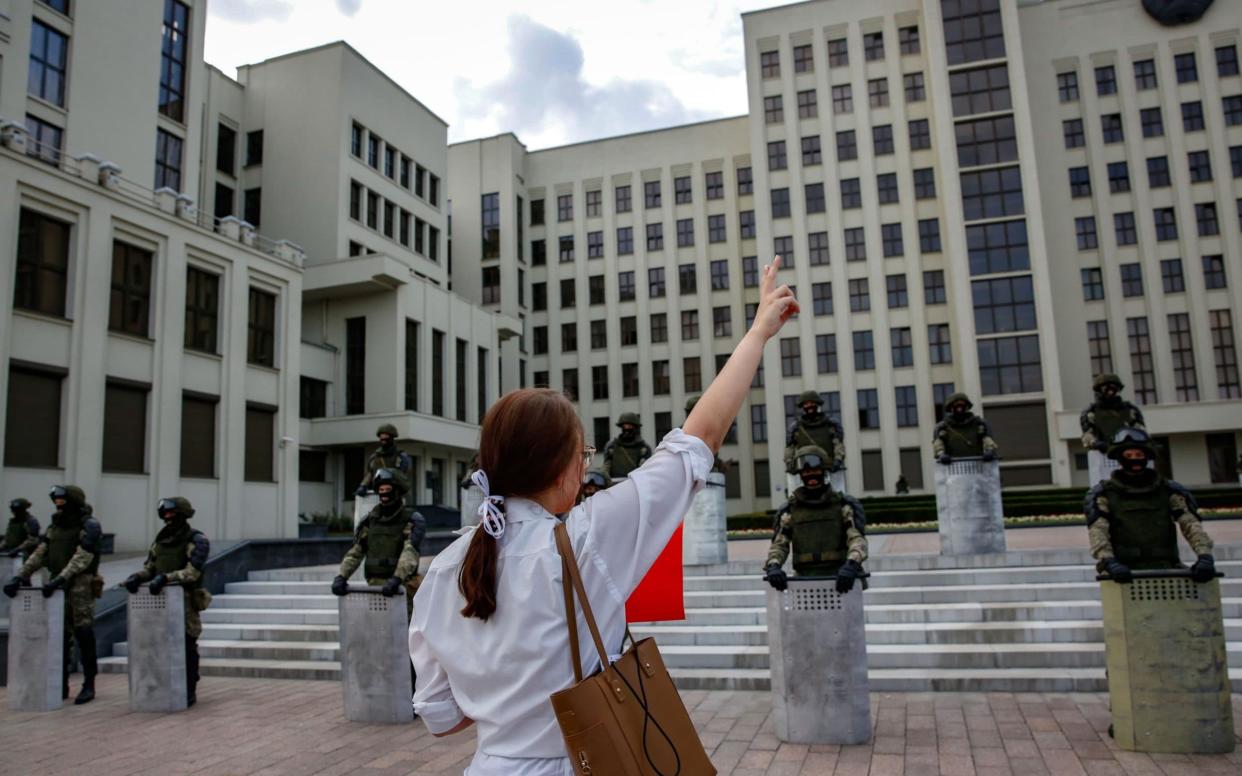Thousands on the streets in Minsk as resistance to Lukashenko reaches new heights

Tens of thousands of anti-regime protesters poured into central Minsk on Friday as resistance to the disputed election victory of Belarusian strongman Alexander Lukashenko reached new heights.
Galvanised by a defiant message from the opposition leader in exile, Svetlana Tikhanovskaya, demonstrators from across society joined an unprecedented display of anger at the result of Sunday's vote and five subsequent nights of police violence.
The crowds marched down Independence Avenue to the seat of government, ignoring military vehicles nearby. A dozen riot police outside put down their shields, and several women carrying flowers embraced them.

Protests have been growing since Mr Lukashenko, whose 26 years of iron-fisted rule have earned him the moniker of “Europe’s last dictator”, was declared the landslide winner amid allegations of widespread vote-rigging.
On Friday, the government released some 1,000 people detained amid the protests, many of them reporting severe beatings and torture, and said it took responsibility for the brutal police crackdown.
It was a move aimed at quelling popular resistance. But instead, the opposition protesters appear emboldened, and the regime on the back foot. Workers at hundreds of factories across the country have downed their tools, with the Belarusian prime minister, Roman Golovchenko, visiting the iconic Minsk Tractor Works amid staff protests.
Dozens of anchors from government media have resigned, while even the state philharmonic orchestra has walked out.
Mr Lukashenko himself was forced to deny that he had fled the country, telling state media he was “still alive” and appealing to workers not to stage strikes that could crash the Belarusian economy.

That call has fallen on deaf ears.
In the western town of Hrodna, thousands of workers came out from various facilities to protest.
Larisa Rybak from the Hrodna Azot plant told the Telegraph that blatant vote-rigging has shaken Belarusians to the core.
“We just wanted a fair election,” she said. “Everyone is scared, and so am I. But you have to take a stand one day.”
From Lithuania, where she fled after the vote amid apparent threats against her children, Mrs Tikhanovskaya demanded Mr Lukashenko hand over power and insisted she was the legitimate winner.
“The people of Belarus came together and said no to the old regime,” she said in a video, rowing back on an earlier statement she appeared to have made under duress before leaving the country.
“Authorities have turned peaceful street demonstrations into a bloody battle,” she said. “I have watched with pain what has happened in our country in recent days.”
Non-violent protests should continue, she urged. International pressure is also ramping up, with EU foreign ministers yesterday holding an emergency meeting to discuss imposing sanctions over the crisis.
An EU diplomat said the gathering decided to instruct their foreign policy unit to prepare a list of individuals to be blacklisted, marking a first step towards new sanctions.
"What happened in Belarus in the last few days is completely unacceptable and calls for a clear reaction of the EU," Germany's foreign minister, Haiko Maas, told reporters.
"We aim to put certain persons who are known and took part in crimes against peaceful protesters under the EU sanctions regime."
At least two people were killed and more than 6,500 were arrested during the nightly crackdowns, which saw police use stun grenades, rubber bullets and tear gas in several cities.
Amnesty International described a campaign of “widespread torture”, and one woman said she had been had been forced to remove her clothes and threatened with rape.
Police fired rubber bullets at passers-by, and snatched motorists out of their cars and beat them unconscious. Many of those released displayed severe injuries and reported being packed into cramped cells.
Ahead of the EU meeting, Belarus's foreign minister, Vladimir Makei, adopted a conciliatory tone, saying the country was ready for “constructive and objective dialogue with foreign partners about the current situation in our country”.
Analysts say Russia, whose traditionally strong ties with Belarus have recently been strained as Moscow presses for closer integration, will seek to influence any outcome.
The Kremlin has yet to indicate whether it is prepared to prop up Mr Lukashenko, although Moscow has said that outside forces are seeking to destabilise Belarus.
Margarita Simonyan, head of the Kremlin-funded channel RT, said on Friday it was time to send in the “little green men”, in a reference to the Russian soldiers without insignia who appeared in Crimea during the Ukraine crisis of 2014.
But Russian political scientist Ekaterina Schulmann said there was little public appetite for direct intervention in Belarus.
“In terms of Russian public opinion, there’s no enthusiasm for deeper integration, so it’s not like it will produce a wave of euphoria similar to Crimea.”
Russian elites will however be watching developments in Belarus with some anxiety, as they showed that repressive leadership is “not a guarantee for regime survival”.

 Yahoo News
Yahoo News 
